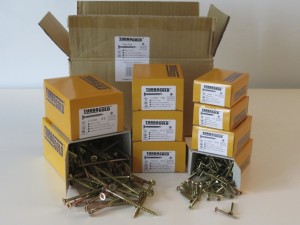Buying screws
Buying screws for your next DIY project is not a job that should be taken lightly, as making the right choice will have you purring with satisfaction when every screw is driven home with ease. However, make the wrong choice and you’ll be screaming in frustration when screw heads snap off, or you just don’t seem to be able to get any purchase on the screws as you desperately try to force them into place. You’ll find more information about different screw types in my ‘Household fixing kit’Â guide, but below, I simply want to point you in the right direction for choosing a good, pretty much all-purpose screw variety that will cope with the vast majority of your DIY needs.
Why don’t some screws work?
What I mean by ‘don’t work’ basically refers to what’s know as cam-out. Essentially this term means the screwdriver tip slips in the head because it’s such a bad fit, and/or the metal is so soft you end up damaging the screw head so that it’s no longer possible to drive it into place. You then have the further nightmare of trying to get it out!
I’m no scientist, not an engineer, and certainly no metallurgical expert, but I’m pretty sure that the quality of metal used coupled with the particular manufacturing process for a screw are the decisive factors here! Screw packs don’t generally give a breakdown of metals, alloys, and percentages used in their construction, so spotting sub-standard materials in their make-up isn’t really possible. Therefore, in order to avoid purchasing what I consider to be screws that ‘don’t work’, I’ve developed my own foolproof checklist when I restock my fixings box.
1. Branded screws
Only ever buy makes or brands that you recognise. Reisser, Wurth, and Spax, to name but a few. Never, ever, go for unbranded packs.
2. Shiny silvery screws
Avoid anything super shiny silver that looks like it has come out of a Christmas cracker. I’m sure there are some such screws out there that do work, and some from reputable manufacturers, but I’ve been caught too many times so I don’t take the risk.
3. Bronzy gold screws
Bronzy gold screws generally mean good news. This normally means they have a zinc and yellow passivated coating which is good for corrosion resistance.
Of course, there are exceptions to the above rules that I go by, but I’d only ever stray from these rules if I’ve had a cast iron recommendation from a colleague.
Screw designs
It is possible to get a bit confused when met with a lot of jargon about screw design technology. Terms like twin thread, single thread, ‘special’ shank, are a few such examples and to be honest, although in many aspects of DIY, technical detail can get me obsessively interested, reading through screw engineering details does tend to put me to sleep. However, that said, the basics are important, and this is where my interests do spring to life. Below are what I feel are the essential design considerations, when purchasing your ‘go-to’ all-purpose screws.
1. Screw head design
I always go for Pozidriv (PZ) screws; as do the majority of tradesmen in this country. They are similar to the older Phillips head design but just have better grip, and are perfect for use with a cordless drill with a Pozidriv bit. The traditional slot-head screw design should really only be used where the screw head is going to be visible (with door handles for example), as they are arguably more attractive than Pozidriv. Also, the slot-head design really isn’t compatible with a cordless drill as the bit slips off the head too easily – so why you can still see racks of slot-head screws in many DIY outlets, always astounds me. What are people using them for? Is it just because this section of their product range is stuck in a time warp? I’d love it if someone could let me know.
2. Countersunk
A countersunk screw head that has clever little bits to ensure it countersinks easily (allows the head of the screw to be easily pulled in below the surface of the surrounding wood), is always important. Good countersink design means less chance of splitting the wood when the screw is driven in place.
3. Sharp tip
Screws have to have a sharp tip. Sounds obvious, but there are so many types out there that haven’t, and it just stands to reason that the sharper the tip, the better and quicker penetration you’ll get into the wood.
My choice for the best screws

Screwfix TurboGold screws are for me, one of the best screw options in the market. Here’s my latest purchase – fresh out the box!
To be honest there are a number of good screws in the market place with the brand names I mentioned earlier all producing screws that I’d have no hesitation in buying. However, my ‘go-to’ general purpose screws have for a long time now been the TurboGold screws which are exclusively supplied by Screwfix. They are generally more competitively priced than equivalents, always do the job for me, and I therefore have no reason to change allegiance.
My favourite great value option (pictured right) is the 1400pc trade pack, as it just has a good selection of screws of the sizes I use most. You do also get a good number of the larger (and therefore expensive) screws in this pack, which for some reason I seem to get through at an astonishing rate.
